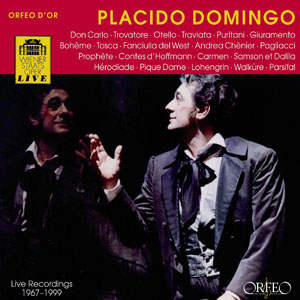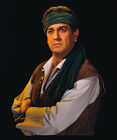
NEW RELEASES
NEW RELEASES of the last 12 months
COMING SOON
ARCHIVE
AWARDS
CDs
SACDs
LPs
MCs
CATALOGUE NUMBERS
|
|
ORFEO International – Catalogue
CDs
 | Plácido DomingoOrfeo • 3 CD • 3h 50min Order No.: C 699 073 D |
|
Composers/Works: |
G. Verdi: Vorspiel (from: La Traviata)
G. Verdi: Io l'ho perduta ... Io la vidi (from: Don Carlo)
G. Verdi: A mezzanotte, ai giardini della Regina
G. Verdi: Quale d'armi fragor poc' anzi intesi? ... Ah! sì, ben mio
G. Verdi: Se m'ami ancor, se voce di figlio ... Ai nostri monti
G. Verdi: Già nella notte densa (Act 1: Otello, Desdemona - from: Otello)
G. Verdi: Dio ti giocondi, o sposo (from: Otello)
G. Puccini: Marcello. Finalmente! (from: La Bohème)
G. Puccini: Risparmiate lo scherno ... Ch'ella mi creda (from: La fanciulla del West)
G. Puccini: E lucevan le stelle (from: Tosca)
G. Puccini: E lucevan le stelle (from: Tosca)
U. Giordano: Credo a una possanza arcana
U. Giordano: Ora soave, sublime ora d'amore!
R. Leoncavallo: Recitar! Vesti la giubba (from: I Pagliacci)
V. Bellini: Introduzione (from: I Puritani)
S. Mercadante: Vittoria! Siracusa! ... Compita è ormai la giusta e terribil vendetta
G. Meyerbeer: Ami, quel nuage obscurcit ta pensée? ... Sous les vastes arceaux
J. Offenbach: Va pour Kleinzach! Il était une fois à la cour d'Eisenach
G. Bizet: Entr' acte
G. Bizet: Partez sans mois - Halte-là! Qui va là? ... La fleur que tu m'avais jetée
G. Bizet: C'est toi! - C'est moi!
C. Saint-Saëns: En ces lieux, malgré moi
J. Massenet: Ne pouvant réprimer les élans de la foi
P. Tschaikowsky: Ya neveryu chtoby ty khotel smert Grafini
R. Wagner: Das süße Lied verhallt
R. Wagner: In fernem Land, unnahbar euren Schritten (from: Lohengrin)
R. Wagner: Ein Schwert verhieß mir der Vater
R. Wagner: Keiner ging, doch einer kam ... Winterstürme wichen dem Wonnemond (from: )
R. Wagner: Siegmund! Sieh auf mich!
R. Wagner: Wehe! Wehe! Was tat ich? - Amfortas, die Wunde! (2nd Aufzug: Parsifal - from: Parsifal)
|
Artists: |
Plácido Domingo (Tenor, Dirigent)
Tugomir Franc (Bass)
Waltraud Meier (Sopran)
Leo Nucci (Bariton)
Raina Kabaivanska (Sopran)
Fiorenza Cossotto (Mezzosopran)
Mirella Freni (Sopran)
Barbara Frittoli (Sopran)
Alberto Rinaldi (Bariton)
Silvano Carroli (Bariton)
Georg Tichy (Bariton)
Richard Burke (Tenor)
Peter Jelosits (Tenor)
Alexander Diepold (Tenor)
Horst Nitsche (Bariton)
Peter Koves (Bariton)
Gabriela Benácková (Sopran)
Hans Helm (Bariton)
Franz Hawlata (Bass)
Torsten Kerl (Tenor)
David Cale Johnson (Bariton)
Herwig Pecoraro (Tenor)
Elena Obraztsova (Mezzosopran)
Cheryl Kanfoush (Sopran)
Axelle Gall (Mezzosopran)
Heinz Zednik (Tenor)
Paul Wolfrum (Tenor)
Agnes Baltsa (Mezzosopran)
Rita Gorr (Mezzosopran)
Catarina Ligendza (Sopran)
Hildegard Behrens (Sopran)
Chor der Wiener Staatsoper (Chor)
Orchester der Wiener Staatsoper (Orchester)
Berislav Klobucar (Dirigent)
Fabio Luisi (Dirigent)
Herbert von Karajan (Dirigent)
James Levine (Dirigent)
Daniel Oren (Dirigent)
Gárcia Navarro (Dirigent)
Leonard Slatkin (Dirigent)
Nello Santi (Dirigent)
Gerd Albrecht (Dirigent)
Marcello Viotti (Dirigent)
Christian Badea (Dirigent)
Carlos Kleiber (Dirigent)
Pinchas Steinberg (Dirigent)
Georges Prêtre (Dirigent)
Seiji Ozawa (Dirigent)
Peter Schneider (Dirigent)
Christoph von Dohnányi (Dirigent)
Horst Stein (Dirigent)
|
There are almost certainly no superlatives left to describe 
Plácido Domingo, Il Trovatore in 1979
Foto: Archive of the Vienna State OperaPlácido Domingo and his standing in the international world of opera today. The fortieth anniversary of his Vienna Opera State début is a further milestone in a career that the tenor, conductor and opera house administrator continues to pursue with unflagging energy. He first appeared on the stage of the Vienna State Opera on 19 May 1967, when he sang the role of the Spanish Infante in Verdi's Don Carlo. Since then he has regularly added to his repertory in Vienna, while also choosing the house to bid farewell to some of his leading roles. Orfeo's new album of highlights from his performances at the Vienna State Opera thus includes his role débuts as Siegmund in Die Walküre and as Jean de Leyde in Meyerbeer's Le prophète as well as his farewell performances as Puccini's Rodolfo and Cavaradossi. In every one of these cases he generates the same storms of enthusiasm as those that attended virtually all his appearances in Vienna. 
Plácido Domingo, Tosca in 1984
Foto: Archive of the Vienna State OperaHis performance as Don Carlo in 1967 was recorded by the house's own technicians and provides the starting point for a traversal of a seemingly boundless repertory that ranges from individual appearances such as Viscardo in Mercadante's Il giuramento to the roles with which he was most closely identified – Otello, Canio, Don José, Hoffmann, Andrea Chénier and Parsifal. Our selection ends with the role of Hermann in Tchaikovsky's Queen of Spades, which Domingo sang under the house's current music director, Seiji Ozawa. But it also includes duets with long-standing partners such as Mirella Freni (Mimì and Desdemona), Agnes Baltsa (Carmen and Delilah) and Waltraud Meier (Eboli and Sieglinde), in every case producing fascinating performances in which the singers invariably strike sparks off one another. The conductors of these excerpts are all eminent practitioners of their trade – they include not only Ozawa but also Herbert von Karajan, Carlos Kleiber, Christoph von Dohnányi, Georges Prêtre and James Levine – and they are joined for the final tracks by Domingo himself in repertory performances of Carmen and La traviata and in a new production of Bellini's I puritani recorded on its first night in 1994. Although the present three-CD set marking the fortieth anniversary of Domingo's Vienna State Opera début may turn out to represent no more than an intermediary stage in his career, it will none the less reflect an important chapter in the story of the living legend that is Plácido Domingo.
|
|

ORFEO
Chormusik & Oratorien
Edition zeitgenössisches Lied
Kammermusik
Lied
Musica Rediviva
Oper
Recital
Symphonie & Konzert
Weihnachten
ORFEO D'OR
Bayerische Staatsoper live
Bayreuther Festspiele live
Deutsche Oper am Rhein
Salzburger Festspieldokumente
Wiener Staatsoper live
Wiener Symphoniker
Dirigenten
Große Sänger d. 20. Jh.
Orchesterkonzerte
Quartette
Solisten
|